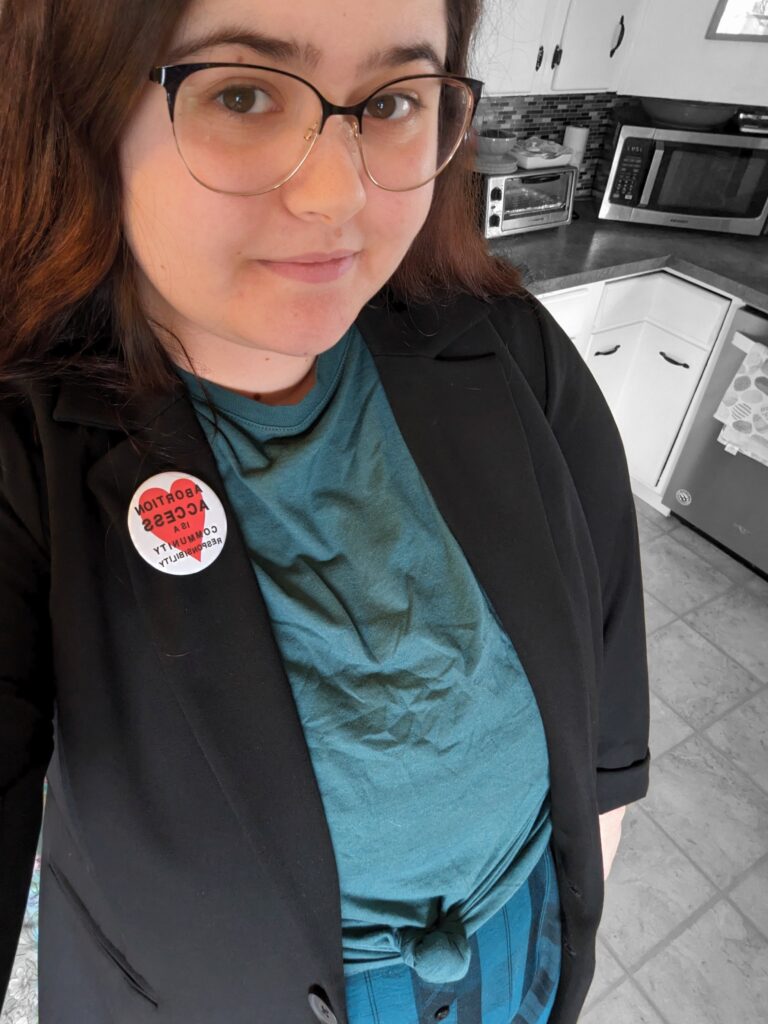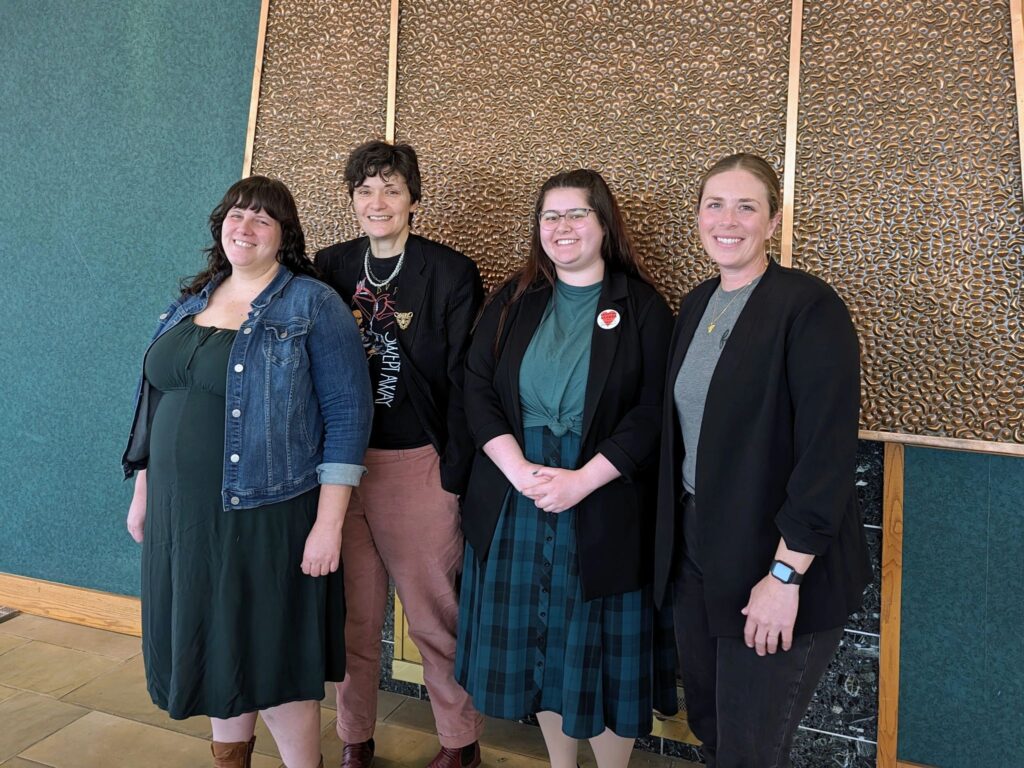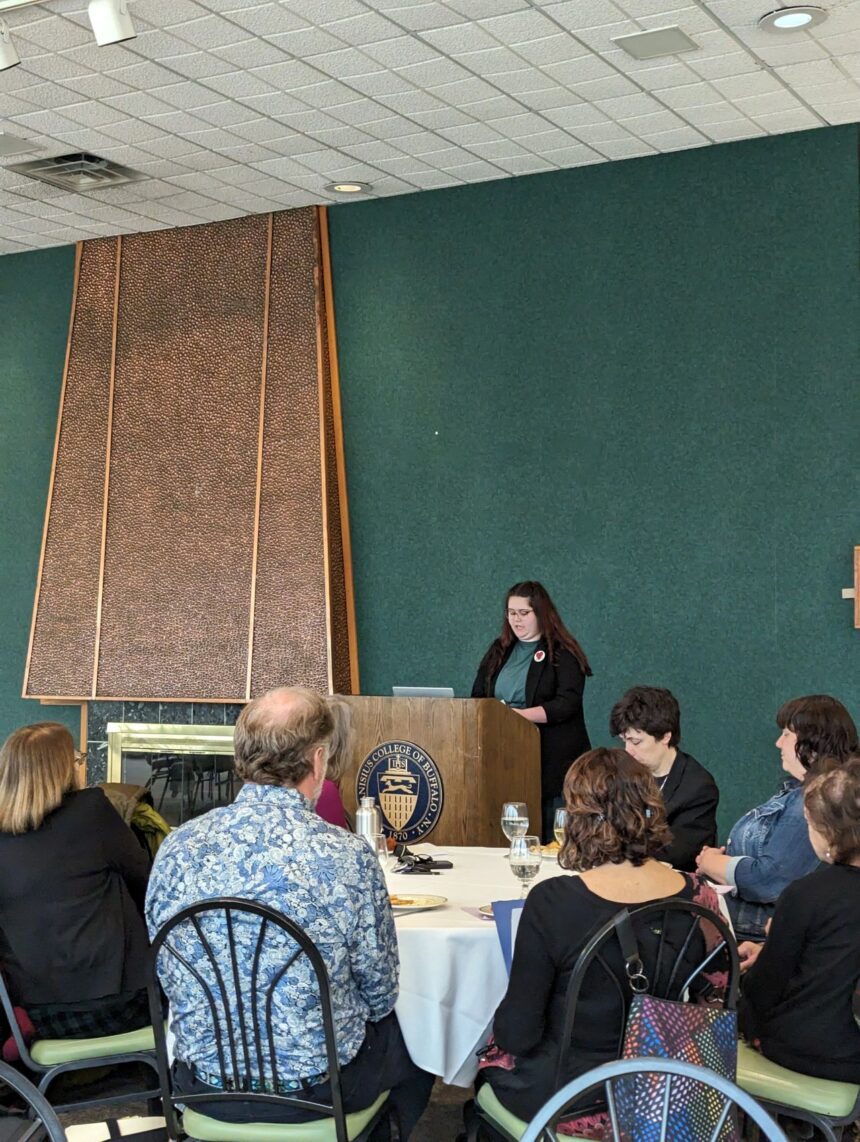On February 29th, 2024, I received an email with the subject line “Congratulations!” With my curious personality, I decided to immediately open this email to figure out why I would be congratulated. In opening this email, I found out that I was being awarded a Lorch Award (The Dr. I. Joan Lorch Award for Women & Gender Studies honors a person who has made a significant contribution to women and who exemplifies the pursuit of liberation and justice regarding sex, gender, and sexuality) and would have to give a 10-minute long speech on gender justice.
Now, I didn’t know if this award was due to the creation of Gender Gazette or because of the Plan B event I held near campus in protest of Canisius’ Students For Life “Everybody Deserves a Birthday” cupcake event. I proceeded to email my professor about it and found out that it was a combination of both. With that being said, I wrote a speech talking about both abortion rights and gender analysis in media. When talking about two uniquely complex social issues, I ran into the roadblock of having TOO MUCH information to talk about! With that being said, I ended up focusing on abortion rights and how my Jesuit university (Canisius University) has handled pro-choice and anti-choice students on campus. I thought that in this post, I should publish this speech since I received so much positive feedback about it.

“What is a feminist? I’m assuming that because you are attending the Lorch Awards, most of you probably know what a feminist is. But also, a shocking amount of the world doesn’t! When asked ‘Are you a feminist?’ during the first week of my women’s health class at the beginning of this semester, many of the men in that class originally said no! But then, when they found out that a feminist is someone who is anti-sexist and wants equal rights for all genders, they realized that perhaps they are a feminist. Many men can get so caught up in playing the part of the successful masculine zombie (as quoted by Herb Goldberg), that they don’t even take the time to research what a feminist is. They see the fem-part of feminism and believe that one must be ‘girly’ to be a feminist. Or that they might be looked at as not man enough if they were to take on the identity of a feminist. “
Side note: the part where I mentioned the “successful masculine zombie” received an unexpected but well-received chuckle from most of the room.
“On a similar note, there is a TikTok trend where an interviewer walks up to a conservative white man (usually at a Trump rally or some other conservative protest), asking what are your pronouns. They come up with what they believe to be hilarious responses…
- My pronouns are USA
- Patriot
- MA / GA
- I don’t have any pronouns
- With one interview going as far as saying, ‘I’m a male…I don’t get into that mentally ill stuff’
Taking observations from my daily life and media intake is what helps me grasp more complex social problems in the world, as someone who has studied communications and the impact of media messaging over the past 3+ years. The 2 examples I gave previously are just 2 of many subtopics I think of when I’m asked about gender justice.
Gender justice is a key struggle in our world because it has a vast amount of categories that fit under it, whether you’re talking about workplace equality, the pay gap, abortion rights, respectful pronoun usage, sexual violence, and so many other important issues that impact a large amount of the world’s population. With this being said, in this speech, I plan to focus on abortion rights as an issue for both women and LGBTQIA+ people.
I initially started my activism journey by posting about women’s rights when the Supreme Court overturned Roe V. Wade in 2022. The words ‘thoughts and prayers’ were seen over and over throughout my social media feeds when it came to many activist movements, but what about policy and change?
It is merely impossible to receive gender justice by just posting on social media. Activism needs action, such as showing up for protests and at the polls. This proactive dimension of activism is what I embraced this past fall.
As you may know, Canisius University has a Students for Life group that participates in the nationwide anti-choice event called 40 Days For Life. During this time, Canisius SFL hosts an annual event called ‘Everybody Deserves a Birthday.’ They draw people into the event through free food. I mean, what college student would refuse free food? But then they give students inaccurate information about abortions with imagery that is not scientifically accurate.
It should be noted that it is the official position of the Catholic church to be opposed to BOTH abortion and contraception, so this event is not much of a surprise, being that it took place here at Canisius University. And while I support the rights of those students to voice their moral views, pro-choice students ought to have that same right to voice their moral views, as well. Other than this being a religious issue, it is also an issue about ‘free speech’ and ‘open dialogue.’ A university should support the rights of all students to think deeply about their ethical views and to fight for them.
In response to the point I just made, I embraced the action part of activism this past fall, showing up for my moral views, and the views that many other students here at Canisius. I teamed up with local activist Jennifer Page (who is more popularly known as Queen City Feminist) to co-host an event at the same time as the cupcake event. We received hundreds of boxes of Plan B from the pro-choice campaign called “Shout Your Abortion” to pass out to students on the public sidewalk just off campus on Main Street.


Many students showed up in solidarity with us and to the pro-choice movement; listening to our take on what was happening, receiving free stickers and buttons (just like the one I’m wearing today), and even getting to take home free Plan B! Alongside these free goodies, we explained the common misconceptions surrounding Plan B and abortions, with an emphasis on Plan B being an emergency contraceptive pill, not an abortion pill. By the end of the event, we ended up handing out almost 100 boxes of Plan B within the 2 hours that we were there, helping many students feel safer on campus.

Safety has been one of the main concerns since the beginning of the pro-choice movement. There are many reasons why someone would choose to have an abortion, including medical issues (such as maternal health issues, miscarriages, and fetal issues), to social issues (such as financial issues or being a victim of sexual violence), to even the desire to just be unpregnant.
To fully understand the importance of the abortion rights movement, it is important to discuss how it has evolved over the years, changing with scientific and technological progress. Starting back in 1550 BCE with the first documented abortion, to gaining traction in the 1960s, the need for abortions has always existed.
The original pro-choice movement of the 1960s worked through word of mouth and by handing out flyers and pamphlets. They used back-alley abortions and underground services to help women in need of reproductive aid.
In contrast to today, the modern pro-choice movement now uses social media and abortion access organizations (such as the New York Abortion Access Fund (NYAAF)) to allow people to get the help they need.
In addition, the science behind abortions has become much safer, with more options on how to receive one. Back-alley abortions are less common, with more medical access and safer procedures being options today. Along with the development of safer procedures, the imagery of the coat hanger has become limited, with the much safer at-home method: abortion pills.
As for Roe V. Wade, between the years 1973 and 2022, there were many legal cases brought to the U.S. Supreme Court. Although none of these cases truly impacted our country as much as the June 24th, 2022 decision to overturn Roe V. Wade. Since then, the argument for abortion pills has taken up a large part of Supreme Court discussions, alongside the fight for abortion access in every state.
The abortion rights movement was originally a subsection of the women’s rights movement but has evolved into an LGBTQIA+ issue, as cisgender women aren’t the only people with uteruses who need abortions. Some other identities that may need abortions include nonbinary people, transgender men, intersex people, and so many other diverse gender identities.
With the ever-evolving pro-choice movement, education has become just as important as action. As someone who has marched for abortion rights over the years, I’ve seen the differences in protest imagery and even just the basic reasons why there are protests. Social movements like the abortion rights movement are constantly evolving, and so are the education and action portions of the movement.
Reflecting on how social movements such as the pro-choice movement have changed over time, it’s clear that learning and taking action are both crucial. Restating my thesis, I believe that gender justice is a key struggle in our world because it has a vast amount of categories that fit under it, whether you’re talking about equality in the workplace, reproductive rights, respectful pronoun usage, and so many other important issues that impact a large amount of the world’s population.
To summarize some of my key points, activism is about action, not just about posting on social media. It includes showing up, voting, protesting, and so much more. Thoughts and prayers aren’t enough. Policy and change are what is needed to achieve gender justice.
As someone whose whole career is focused around social media marketing and communications, it is important to realize that social media can only do so much. Especially with the current representatives and elected officials who are responsible for policy change… they aren’t looking at everyone’s Instagram stories to see how the general public feels. But, they are looking at the crowds who show up for protests and at the polls.
Let me leave you with this quote that bell hooks once said, ‘What we do is more important than what we say or what we believe.’ Thank you.”
With the end of my speech came a roar of clapping and appreciative cheers from the audience, including one woman calling me a “Badass” for standing up for what I believe in. Hearing someone at a Jesuit university stand up for the basic human right of bodily autonomy brought hope to many staff and community members.

I am beyond grateful to have received the 2024 student Lorch Award and hope to have inspired others to stand up for their views, because as I had stated in my speech, “A university should support the rights of all students to think deeply about their ethical views and to fight for them.” A school such as Canisius University should have clubs and groups that reflect the student population’s views, not just the views of the Catholic church. Canisius still refuses to allow a pro-choice group on campus. And while they are slowly heading in the right direction (hosting their FIRST ever drag show last year), there is still alot of progress to be made to make everyone feel welcome in their learning environment.


Leave a Reply